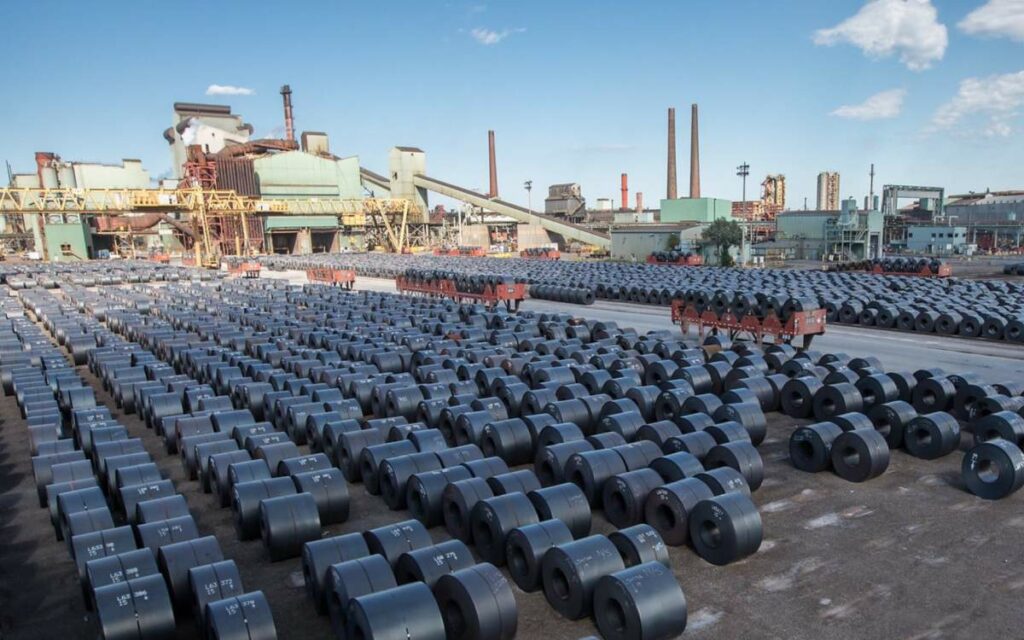
Though somewhat counter-intuitive, to facilitate its green transition the Hamilton steelmaker’s demand for natural gas will double. Photo credit: Twitter/ArcelorMittal Dofasco
Hamilton-based steelmaker ArcelorMittal Dofasco will require a 14-kilometre natural gas pipeline as a part of their transition to producing steel in a more environmentally friendly way.
The $1.8-billion green steel project, which received funding from both the federal and provincial governments, will see coal-fed coke ovens and blast furnaces replaced with an iron-fed electric arc furnace (EAF) and a direct reduced iron facility.
The goal is to eliminate the use of coal and coke from ArcelorMittal Dofasco’s steel-making process. Currently, the steelmaker is one of the largest sources of greenhouse gas emissions in the entire province.
The company will instead switch to using natural gas to power furnaces, but the goal is to eventually move to hydrogen, with the EAF being classified as “hydrogen-ready” technology.
In order to facilitate the transition, Dofasco’s demand for natural gas will double, meaning that a 14-kilometre natural gas pipeline to their property is needed. The company hopes to transition to greener steel by 2028, but the project hinges on the pipeline construction.
Energy company Enbridge, which provides natural gas to the Hamilton area, has drawn up three proposed routes that the pipeline could take.
Their preferred route would run along multiple roads, starting with Highway 56 on the Hamilton Mountain before running north towards Lake Ontario via Centennial Parkway, and west along Barton Street East before reaching the steelmaker via Kenilworth Avenue North.
Their second choice would see the pipeline start in Flamborough, travel along York Boulevard, Stuart Street, Bay Street North, and Burlington Street East.
Their least preferable option would see the natural gas pipeline be built through King’s Forest Golf Course on its way to the plant.
It is unclear at this time how much the pipeline would cost. The approval process requires environmental studies, public consultation, and various permits. Enbridge will report to City Council with an update and then go to the Ontario Energy Board for approval.
They hope to receive approval by August 2024 and start construction in Spring 2025, with a completion date in December 2025. At that time Dofasco aims to phase out their coal-fed coke ovens over two years, with full phase-out by 2028.
The switch will reduce carbon dioxide (CO2) emissions by about three million tonnes annually, the equivalent of taking almost one million cars off the road.
From there, Dofasco is committed to reducing emissions even further, promising net zero emissions by 2050, with natural gas being replaced by hydrogen or another energy source.
With two of the proposed routes following road corridors, Enbridge says it may need to partially or fully close some sections during pipeline construction, but that it will replace the roads, leaving them in the same or better condition following any work.
Public consultation on the project is taking place over the next couple of weeks, with hundreds of Hamilton residents receiving leaflets in the mail informing them of the project.
In-person sessions are set for Thursday, March 2, 2023, from 5PM to 8PM at Stoney Creek Lions Club and Wednesday, March 8, 2023, from 5PM to 8PM at Mount Hamilton Legion. Online input will be taken at hamiltonreinforcement.com between February 27 and March 12.
As a result of the $1.8-billion-dollar investment, ArcelorMittal Dofasco Hamilton will be the first integrated steel mill in North America to transition off of coal and among the first in the entire world, which, Ontario Minister of Environment Conservation and Parks David Piccini notes is “a massive achievement for the province and for Canada and will solidify Ontario as a global leader in the transition to low-carbon manufacturing, including of electric vehicles.”
The construction phase of the green steel project will also reportedly create an estimated 2,500 jobs, 50 co-op placements, and 30 apprenticeship placements. A total of 160,000 hours of training will need to be logged in order to transition current employees to the new equipment.

Based in Hamilton, he reaches hundreds of thousands of people monthly on Facebook, Instagram, TikTok, and Twitter. He has been published in The Hamilton Spectator, Stoney Creek News, and Bay Observer. He has also been a segment host with Cable 14 Hamilton. In 2017, he received the Chancellor Full Tuition Scholarship from the University of Ottawa (BA, 2022). He has also received the Governor General’s Academic Medal. He formerly worked in a non-partisan role on Parliament Hill in Ottawa.


















